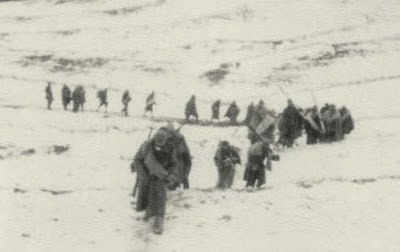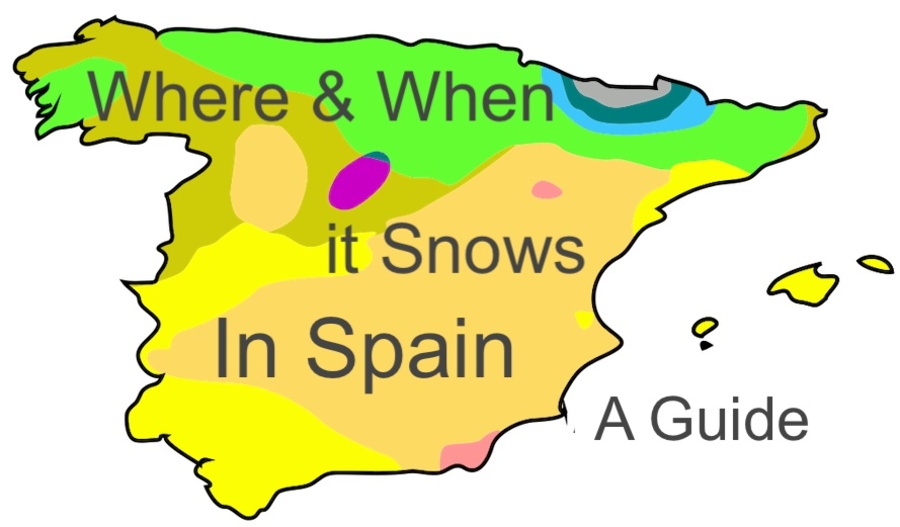Sun 14 February 2021
Spain Guides | Does It Snow in Spain Where and When Guide
Does It Snow in Spain? Yes, Here’s Where and When - a Guide
Does it snow in Spain? Yes, it can and does snow in Spain, but there’s more to it than just that straight answer, climates vary depending on where you are. So in this article, we’re going through where it snows in Spain when it snows in Spain and also looking at a few extremes - because you just never know!
Let’s start with a quick summary...
In winter, regions at an altitude of 4900 feet or more above sea level are likely to experience winter snowfall. Mountain regions, like the Pyrenees and the Sierra Nevada, are covered in snow year-round. Oceanic climate zones, like Cantabria and Navarre, and Galicia see frequent snowfall in winter.
If you’re looking to buy your summer home, or settle down in the warmer climate of Spain, then there’s no need to stick another pin in the globe in search of somewhere else just yet. Let’s get into more of the details...
Spain is actually situated on a “heightened plateau” in the Iberian Peninsula within Europe. Aside from the Canary Islands, Spain has around 13 climate zones according to the Köppen climate classification system.
Climate Zones map (source) <a href="https://commons.wikimedia.org/wiki/File:Spain_map_of_K%C3%B6ppen_climate_classification.svg">Ali Zifan (Enhanced, modified, and vectorized).</a>, <a href="https://creativecommons.org/licenses/by-sa/4.0">CC BY-SA 4.0</a>, via Wikimedia Commons
With such diversity in its climate zones, Spain holds a place in the list of the top ten most climatically diverse nations on the planet.
In its basic form though, Spain can be divided into five major climatic zones:
Hot-summer Mediterranean
Warm-summer Mediterranean
Warm-summer Continental
Semi-arid
Oceanic
There are also minor climatic sub-zones. These include:
Humid subtropical
Alpine
Hot desert or Arid
Subarctic
Why does it snow in Spain?
When compared to most other European countries, Spain is comparatively drier, owing to the fact that the snowfall or other precipitation such as rain is not as frequent, but it’s still prevalent in some places.
In fact, over the years on more than one occasion, Spain has experienced so much snow in certain parts of the country that it impacted everyday human activities and traffic. Combined with blizzards, these occasions posed a major concern for the Spanish authorities.
It snows in specific parts of Spain. The mountainous regions receive snowfall most often, which makes Spain an amazing skiing destination during the winter months.
Temperatures can drop as low as 28 degrees Fahrenheit. Owing to the several different climate zones, Spain boasts diverse weather. This also means that the tourists can plan a variety of activities in each region.
Typical winter day in Spain for snow
Here is a snapshot of a typical mid-winter day in Spain. The small green patches are areas that may receive snow of between 1-5 cm. The shaded areas may see rain.
Image source
As you can see from the image below, the snow that is forecast above is almost all forecast over Spain’s mountain ranges.
Image source
Spain snow facts
Here’s a selection of facts and information about temperatures, climates, and snowfall in Spain to give you a broader picture.
The average snowfall in Spain is 26 days, but that is over a number of regions where extremes can vary
Snow in many places can be rare. Madrid has around 1 day per month in December, January, and February. In January 1941, Madrid recorded 8 snow days the most for any month.
You will rarely see snow on the southeastern coast as it’s one of the driest places in Europe, with even rain being less than 6.1" per year.
The Pyrenees receives around 26 days of snowfall per annum, between November and April
The central plateau of Spain is cold in the winter and hot in the summer
The coldest temperature ever recorded in Spain was in Molina de Aragon, recorded at 28.2 °C (−18.8 °F? on January 28th, 1952
Burgos is recorded as being generally the coldest city in Spain
The warmest places to live in Spain are considered to be Malaga, Canary Islands, Almeria, Murcia & Cartagena, and Marbella.
For all year round Mediterranean temperature, aim for the Costa Blanca and the region of Valencia
So why ntot start your property search in Madrid. Or better still, if you want to escape the cold, then search here.
Mountains receive the bulk of snow in Spain
While most Spanish winters are mild, and many areas see little by way of what you might consider cold weather, naturally, it’s still the winter that is considered the coldest time to visit Spain.
Mountains receive a lot of snowfall above 2000 meter altitudes (6500ft). Above 1800 meters (5900ft) hill areas regularly drop below freezing. Cold winds plague the north interior of Spain. But, even during this time, southern areas are still hot and even arid due to their proximity to the Sahara.
So there are lots of places in Spain that are largely unaffected by the winter as it’s mainly the Mountain peaks and occasional northern areas.
Previous extreme snow conditions in Spain
Like many nations, Spain is not immune to severe weather conditions, including those of severe snow. On some occasions, Spain has found itself in lots of snow, here are a couple of times in history when heavy snow has occurred...
Snowfall during the battle of Teruel
The battle of Teruel was fought between 1937 to 1938 in the Spanish Civil War.
During this time, Spain experienced one of its harshest winters in the country’s history. Temperatures dropped to below -20 degrees Celsius. According to records, the excruciating weather resulted in the death of as many soldiers as those killed in the battle itself.

Battle of Teruel
(image source)
The beast from the east
Extreme snowfall in Barcelona and other major cities of Spain is rare - mainly due to several factors; one of those major factors being the ‘urban heat island effect’, a phenomenon commonly found in major cities.
Human buildings and architecture with lots of concrete tend to keep the temperature of urban areas warmer than their rural counterparts.
Due to this, busy and urbanized cities like Barcelona and Madrid typically only receive snow in short spells, and that too melts away within a day or so if not within a few hours.
In February 2018, Barcelona and a few other major areas of the country were hit by a climate system that was termed as ‘beast from the East’.
Originating from Siberia, the unusual weather affected a number of countries in Europe, including Spain. All major road networks in Barcelona were covered in heavy snow, leading to a disruption in day-to-day activities and traffic.
Storm Filomena
In more recent times, January 8th to 10th, 2021, saw the heaviest snowfall ever recorded in the past 50 years hit the city of Madrid and central and southern Spain. Snow mounted up to 18 inches deep.
According to the Spanish national weather agency, this is the heaviest snowfall that the city has experienced since 1971.
But events like this are very rare ... so much so that they make for big news headlines. By contrast, let’s take a look at the warmer areas of Spain...
Finally...
We hope this has helped you in understanding more about the question, does it snow in Spain. The main reason people move to Spain is exactly because of the minimal snowfall and the higher average temperatures. Spain is known for it.
So wherever you go in Spain, you’re sure to receive ample amounts of sunshine, and perhaps any cold snaps might be a welcome relief from the sun! So start your dream home journey here.
If you’d like to speak with the author, then michael@1casa.com is available to discuss your needs personally, please quote file 3091 Thank you!


